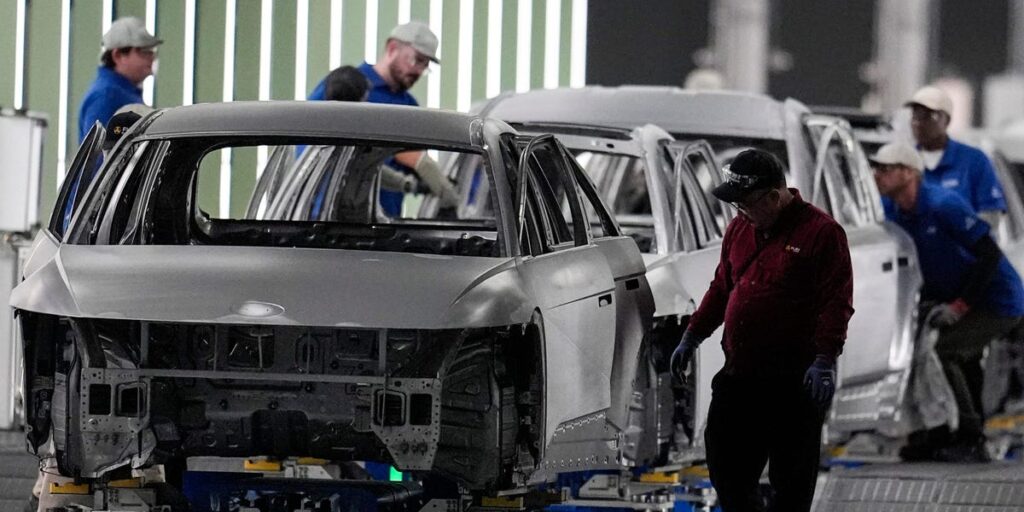The impact of an immigration raid on a sprawling Hyundai factory on Thursday is reverberating far beyond its home in rural Georgia.
The operation, called by one US official the “largest single-site enforcement operation” in history, detained nearly 500 workers, most of them South Korean.
It also jolted a company that has poured billions into America’s South, helping transform the region into a major global auto manufacturing hub. For South Korea, the raid hit a national champion that has played a decadeslong role in deepening economic ties with its Western ally.
South Korea’s leaders are now scrambling to contain the fallout both at home and in the United States.
Gi-Wook Shin, a sociology professor and founding director of Stanford University’s Korean Studies Program, told Business Insider that the raid puts South Korean President Lee Jae Myung in a difficult position.
The Korean leader needs to balance the country’s alliance overseas with his nation’s own interests, he said. Back home, Lee faces his liberal supporters who, while not enthusiastic about Trump, nonetheless accept that the country needs to work with the US, Shin said.
“The Lee Government is really trying to work with the Trump administration to strengthen the alliance and really trying to accommodate Trump’s policy,” Shin said. “So that’s why what happened now is not good timing, and Mr. Lee will be in a tough position politically inside Korea.”
In recent months, South Korean officials have met with the Trump administration for trade talks and announced massive investments in the United States.
After Lee’s August summit at the White House, South Korea unveiled a $150 billion investment into the US, backed by private companies. Hyundai Motor Group alone announced a $26 billion pledge — part of which would go toward a new steel mill plant in Louisiana.
The Hyundai factory raided on Thursday in Ellabell, Georgia — about 30 miles west of Savannah — is the company’s largest manufacturing footprint in the South. The facility had its grand opening in late March with an event that was attended by Republican Gov. Brian Kemp.
With a joint investment from LG Energy Solutions, the so-called Metaplant grew into a $7.59 billion investment, projected to bring in 8,500 jobs to the state. Parts of the 3,000-acre campus were still under construction during the raid.
A spokesperson for LG Energy Solutions said about 250 affected workers were affiliated with the HL-GA Battery Company, a joint venture between Hyundai Motor Group and LG Energy Solution.
“For now, our top priority is ensuring the safety and well-being of our employees and partners, and we will commit our best efforts to ensure their safe and prompt returns,” the spokesperson said.
A.J. Jacobs, an East Carolina University professor who has written two volumes on the Korean automotive industry, told Business Insider that Hyundai has so far supported nearly 30,000 direct and indirect jobs in the United States.
Hyundai’s first major US plant was built in Montgomery, Alabama, in 2002. In 2009, the Korean automaker opened another about 90 miles away in West Point, Georgia, bringing in another 3,200 jobs.
Both investments came at a time when the regions were seeing high unemployment rates and industrial decline, Jacobs said. Alabama and Georgia weren’t yet the major auto manufacturing centers they are today.
“What it’s done is it brought prestige to their governors and mayors, got them re-elected, and it’s brought some visibility to those states for international investors and foreign direct investment,” Jacobs said. “To quantify the impact of these investments — I really couldn’t even venture to guess how many billions of dollars have been invested in Alabama and Georgia prior to the Metaplant.”
Because of its deep roots in the South, Jacobs said there’s little that would push Hyundai to abandon its production centers there.
“In my opinion, there’s almost nothing that would get them to stop producing vehicles in the United States and stop growing,” Jacobs said. “They hit an all-time sales record again this month. Every year they do.”
Shin, the Stanford professor, said South Korea will likely be cautious in its response, especially if the probe unveils that any of the detainees were breaking the law.
On Sunday morning, multiple Korean media reported that the president’s chief of staff, Kang Hoon-Sik, announced a deal to release more than 300 South Korean workers detained in the raid. The official said a charter plane will be sent to bring the workers home.
No criminal charges have been announced.
White House spokesperson Abigail Jackson said in a statement to Business Insider that “Trump will continue delivering on his promise to make the United States the best place in the world to do business, while also enforcing federal immigration laws.”


